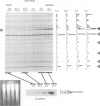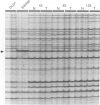Abstract
C-myc gene activation is a common event in multiple types of neoplasia and has been associated with different cellular processes relevant to the malignant transformation of cancer cells. C-myc gene amplification has been analysed in colorectal carcinomas by means of an innovative DNA fingerprinting method based on the arbitrarily primed PCR. This method requires a low amount of DNA, uses multiple internal controls and appears sensitive and reproducible. Clinicopathological and molecular correlates have been investigated in a series of 70 colorectal carcinomas. The incidence of c-myc amplification was 26%, ranging from two- to fivefold increase in copy number. C-myc amplification occurrence was more frequent in more advanced stages of tumour invasion (P < 0.001) and was associated with mutations in the p53 tumour-suppressor gene (P = 0.048). The presence of c-myc amplification was indicative of a shorter disease-free survival period but, because of its strong association with Dukes' stage, its prognostic value is questionable.
Full text
PDF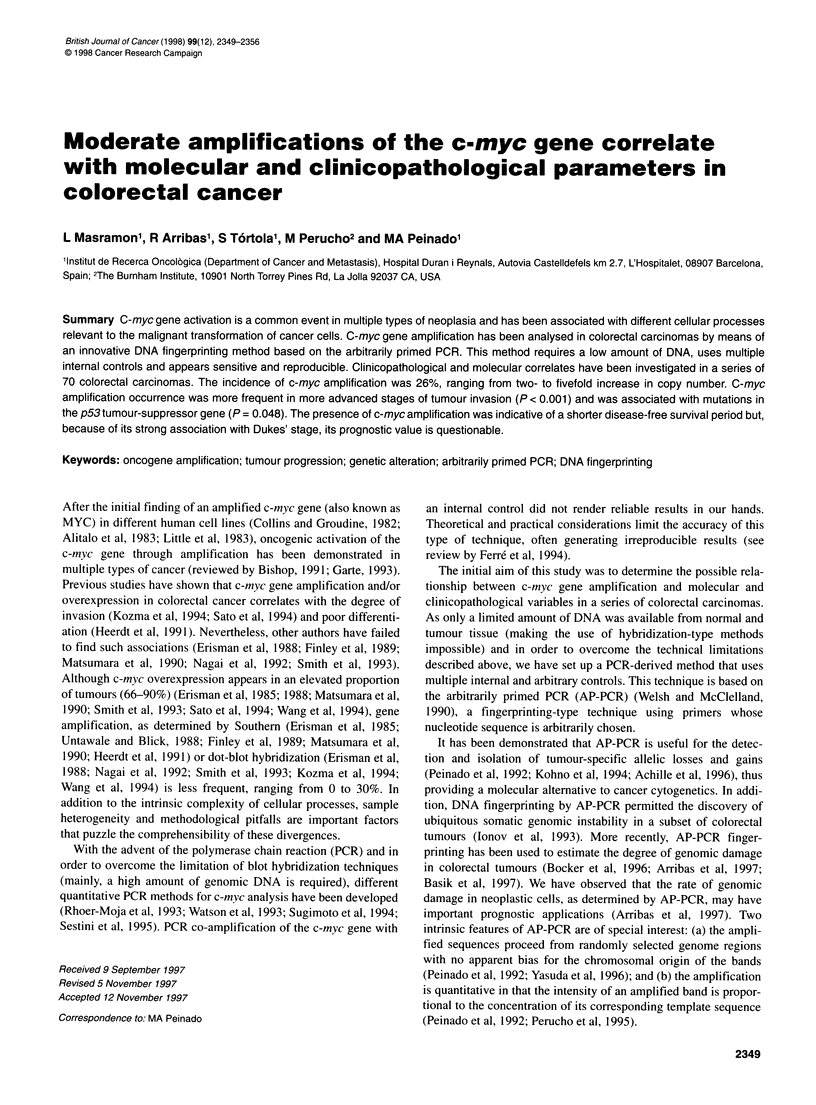
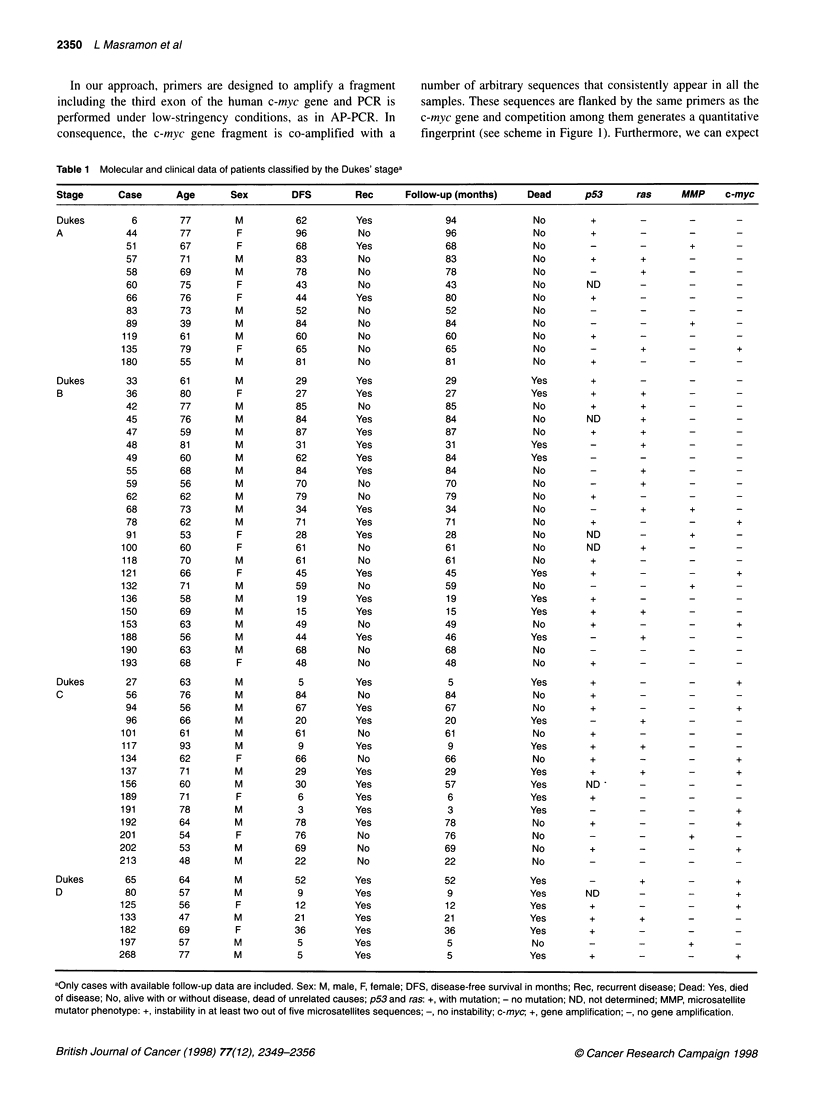
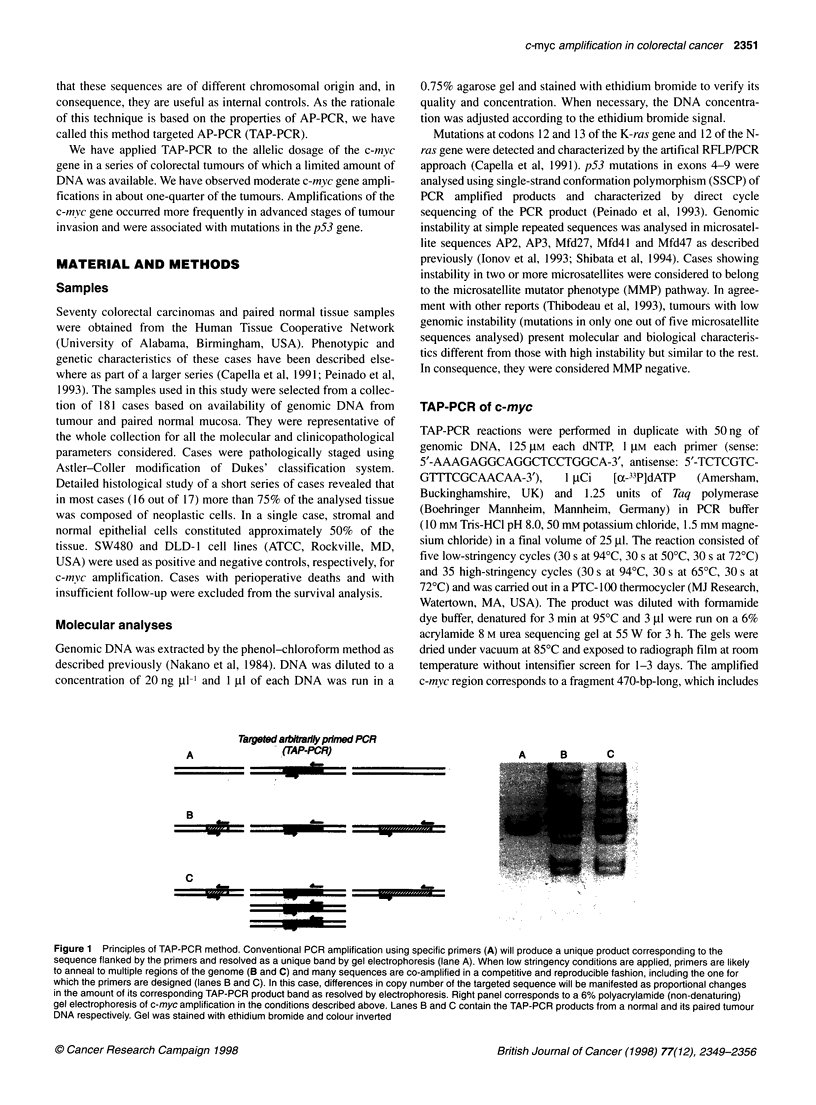
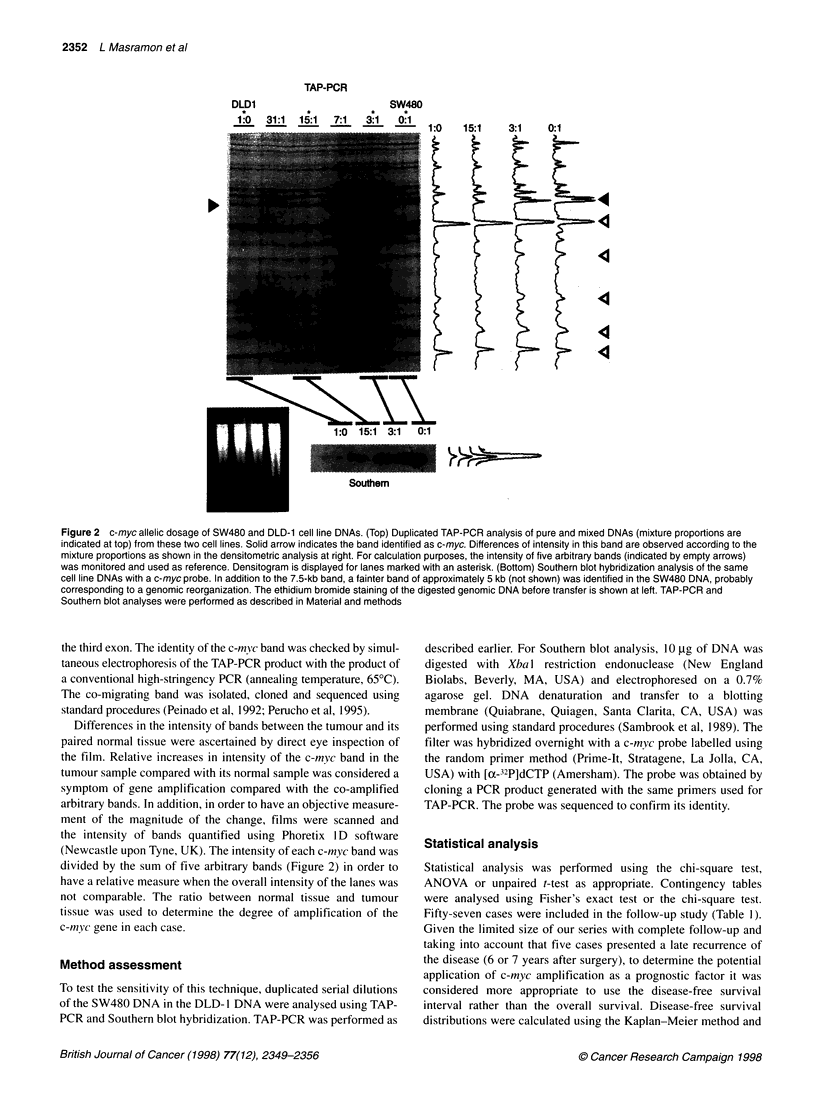
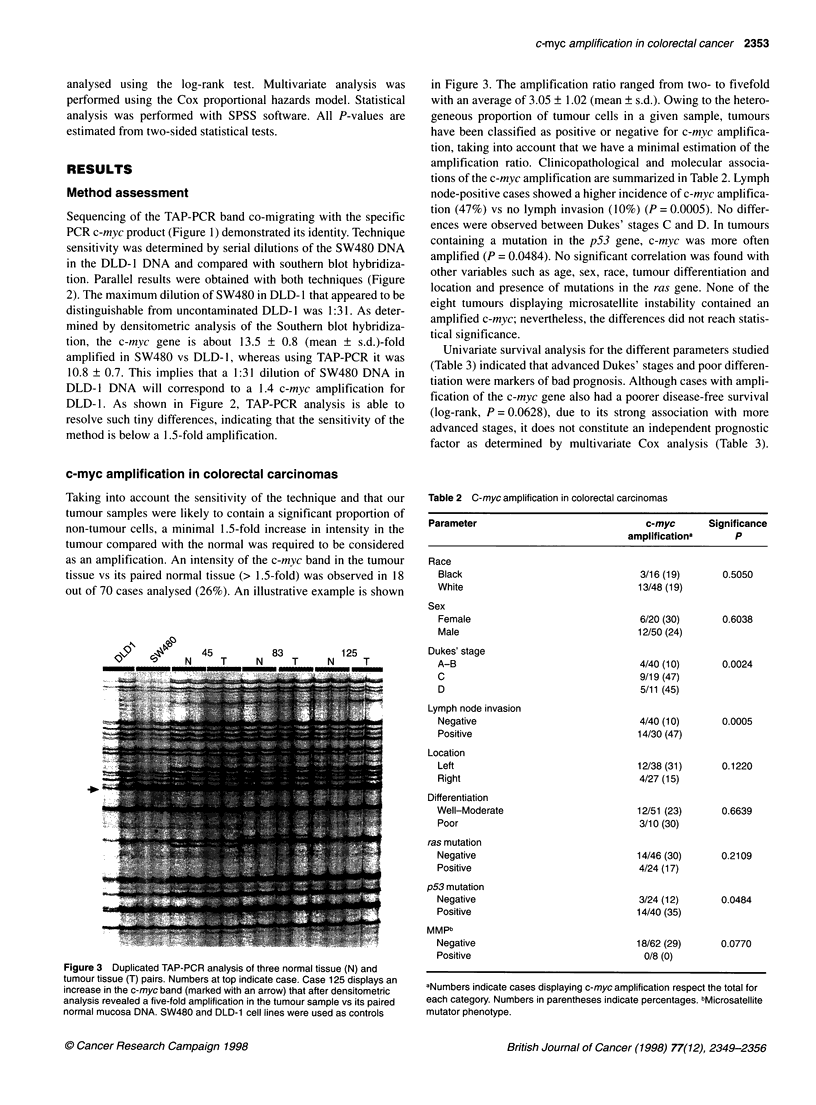
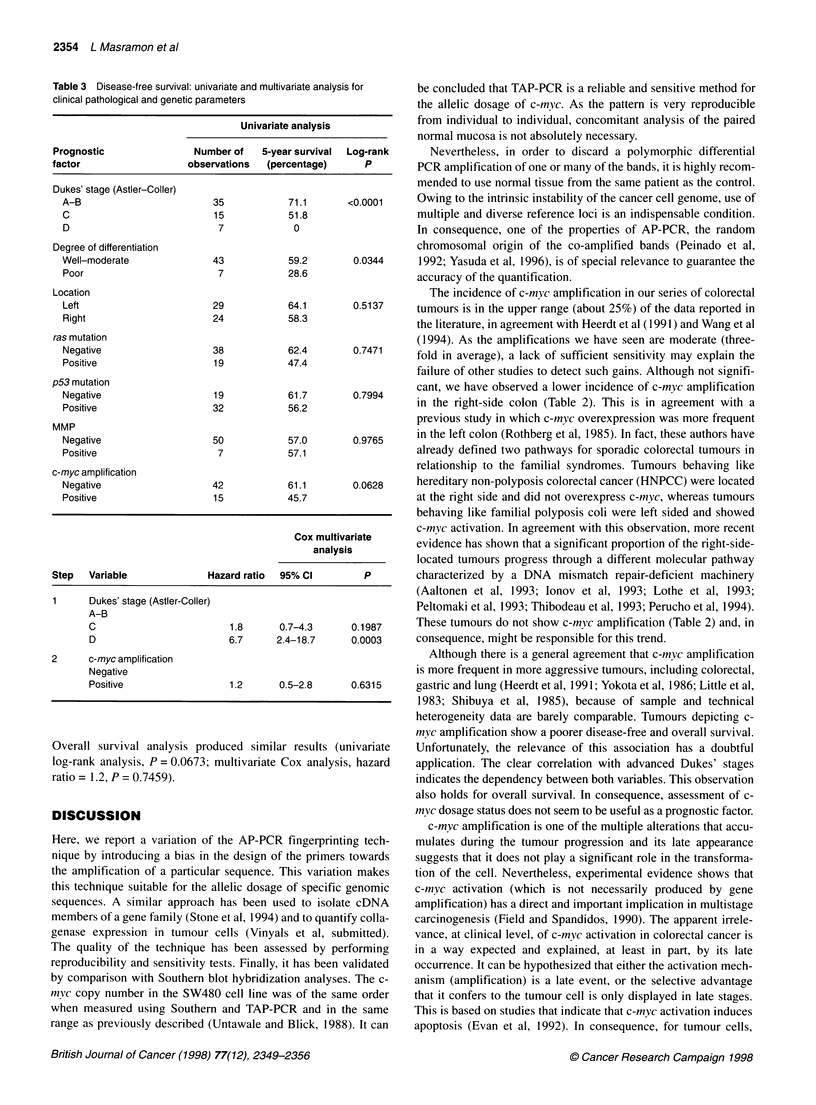
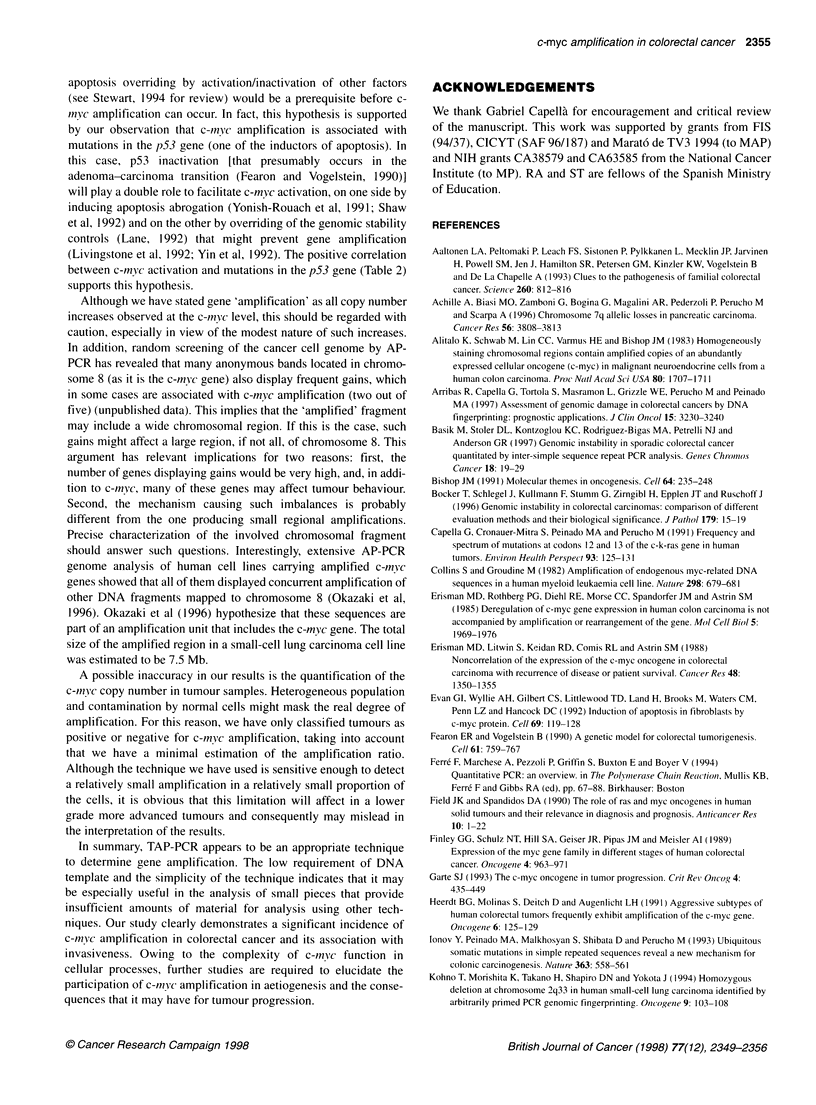
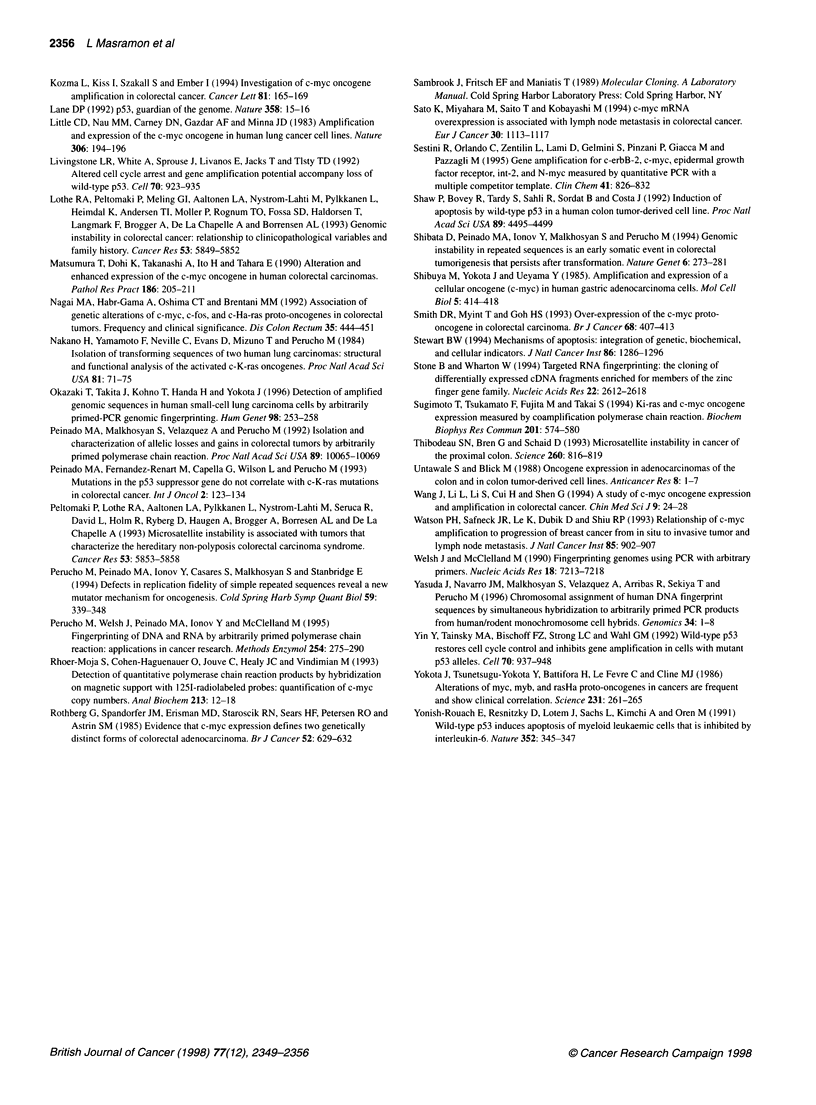
Images in this article
Selected References
These references are in PubMed. This may not be the complete list of references from this article.
- Aaltonen L. A., Peltomäki P., Leach F. S., Sistonen P., Pylkkänen L., Mecklin J. P., Järvinen H., Powell S. M., Jen J., Hamilton S. R. Clues to the pathogenesis of familial colorectal cancer. Science. 1993 May 7;260(5109):812–816. doi: 10.1126/science.8484121. [DOI] [PubMed] [Google Scholar]
- Achille A., Biasi M. O., Zamboni G., Bogina G., Magalini A. R., Pederzoli P., Perucho M., Scarpa A. Chromosome 7q allelic losses in pancreatic carcinoma. Cancer Res. 1996 Aug 15;56(16):3808–3813. [PubMed] [Google Scholar]
- Alitalo K., Schwab M., Lin C. C., Varmus H. E., Bishop J. M. Homogeneously staining chromosomal regions contain amplified copies of an abundantly expressed cellular oncogene (c-myc) in malignant neuroendocrine cells from a human colon carcinoma. Proc Natl Acad Sci U S A. 1983 Mar;80(6):1707–1711. doi: 10.1073/pnas.80.6.1707. [DOI] [PMC free article] [PubMed] [Google Scholar]
- Arribas R., Capellà G., Tórtola S., Masramon L., Grizzle W. E., Perucho M., Peinado M. A. Assessment of genomic damage in colorectal cancer by DNA fingerprinting: prognostic applications. J Clin Oncol. 1997 Oct;15(10):3230–3240. doi: 10.1200/JCO.1997.15.10.3230. [DOI] [PubMed] [Google Scholar]
- Basik M., Stoler D. L., Kontzoglou K. C., Rodriguez-Bigas M. A., Petrelli N. J., Anderson G. R. Genomic instability in sporadic colorectal cancer quantitated by inter-simple sequence repeat PCR analysis. Genes Chromosomes Cancer. 1997 Jan;18(1):19–29. [PubMed] [Google Scholar]
- Bishop J. M. Molecular themes in oncogenesis. Cell. 1991 Jan 25;64(2):235–248. doi: 10.1016/0092-8674(91)90636-d. [DOI] [PubMed] [Google Scholar]
- Bocker T., Schlegel J., Kullmann F., Stumm G., Zirngibl H., Epplen J. T., Rüschoff J. Genomic instability in colorectal carcinomas: comparison of different evaluation methods and their biological significance. J Pathol. 1996 May;179(1):15–19. doi: 10.1002/(SICI)1096-9896(199605)179:1<15::AID-PATH553>3.0.CO;2-N. [DOI] [PubMed] [Google Scholar]
- Capella G., Cronauer-Mitra S., Pienado M. A., Perucho M. Frequency and spectrum of mutations at codons 12 and 13 of the c-K-ras gene in human tumors. Environ Health Perspect. 1991 Jun;93:125–131. doi: 10.1289/ehp.9193125. [DOI] [PMC free article] [PubMed] [Google Scholar]
- Collins S., Groudine M. Amplification of endogenous myc-related DNA sequences in a human myeloid leukaemia cell line. Nature. 1982 Aug 12;298(5875):679–681. doi: 10.1038/298679a0. [DOI] [PubMed] [Google Scholar]
- Erisman M. D., Litwin S., Keidan R. D., Comis R. L., Astrin S. M. Noncorrelation of the expression of the c-myc oncogene in colorectal carcinoma with recurrence of disease or patient survival. Cancer Res. 1988 Mar 1;48(5):1350–1355. [PubMed] [Google Scholar]
- Erisman M. D., Rothberg P. G., Diehl R. E., Morse C. C., Spandorfer J. M., Astrin S. M. Deregulation of c-myc gene expression in human colon carcinoma is not accompanied by amplification or rearrangement of the gene. Mol Cell Biol. 1985 Aug;5(8):1969–1976. doi: 10.1128/mcb.5.8.1969. [DOI] [PMC free article] [PubMed] [Google Scholar]
- Evan G. I., Wyllie A. H., Gilbert C. S., Littlewood T. D., Land H., Brooks M., Waters C. M., Penn L. Z., Hancock D. C. Induction of apoptosis in fibroblasts by c-myc protein. Cell. 1992 Apr 3;69(1):119–128. doi: 10.1016/0092-8674(92)90123-t. [DOI] [PubMed] [Google Scholar]
- Fearon E. R., Vogelstein B. A genetic model for colorectal tumorigenesis. Cell. 1990 Jun 1;61(5):759–767. doi: 10.1016/0092-8674(90)90186-i. [DOI] [PubMed] [Google Scholar]
- Field J. K., Spandidos D. A. The role of ras and myc oncogenes in human solid tumours and their relevance in diagnosis and prognosis (review). Anticancer Res. 1990 Jan-Feb;10(1):1–22. [PubMed] [Google Scholar]
- Finley G. G., Schulz N. T., Hill S. A., Geiser J. R., Pipas J. M., Meisler A. I. Expression of the myc gene family in different stages of human colorectal cancer. Oncogene. 1989 Aug;4(8):963–971. [PubMed] [Google Scholar]
- Garte S. J. The c-myc oncogene in tumor progression. Crit Rev Oncog. 1993;4(4):435–449. [PubMed] [Google Scholar]
- Heerdt B. G., Molinas S., Deitch D., Augenlicht L. H. Aggressive subtypes of human colorectal tumors frequently exhibit amplification of the c-myc gene. Oncogene. 1991 Jan;6(1):125–129. [PubMed] [Google Scholar]
- Ionov Y., Peinado M. A., Malkhosyan S., Shibata D., Perucho M. Ubiquitous somatic mutations in simple repeated sequences reveal a new mechanism for colonic carcinogenesis. Nature. 1993 Jun 10;363(6429):558–561. doi: 10.1038/363558a0. [DOI] [PubMed] [Google Scholar]
- Kohno T., Morishita K., Takano H., Shapiro D. N., Yokota J. Homozygous deletion at chromosome 2q33 in human small-cell lung carcinoma identified by arbitrarily primed PCR genomic fingerprinting. Oncogene. 1994 Jan;9(1):103–108. [PubMed] [Google Scholar]
- Kozma L., Kiss I., Szakáll S., Ember I. Investigation of c-myc oncogene amplification in colorectal cancer. Cancer Lett. 1994 Jun 30;81(2):165–169. doi: 10.1016/0304-3835(94)90198-8. [DOI] [PubMed] [Google Scholar]
- Lane D. P. Cancer. p53, guardian of the genome. Nature. 1992 Jul 2;358(6381):15–16. doi: 10.1038/358015a0. [DOI] [PubMed] [Google Scholar]
- Little C. D., Nau M. M., Carney D. N., Gazdar A. F., Minna J. D. Amplification and expression of the c-myc oncogene in human lung cancer cell lines. Nature. 1983 Nov 10;306(5939):194–196. doi: 10.1038/306194a0. [DOI] [PubMed] [Google Scholar]
- Livingstone L. R., White A., Sprouse J., Livanos E., Jacks T., Tlsty T. D. Altered cell cycle arrest and gene amplification potential accompany loss of wild-type p53. Cell. 1992 Sep 18;70(6):923–935. doi: 10.1016/0092-8674(92)90243-6. [DOI] [PubMed] [Google Scholar]
- Lothe R. A., Peltomäki P., Meling G. I., Aaltonen L. A., Nyström-Lahti M., Pylkkänen L., Heimdal K., Andersen T. I., Møller P., Rognum T. O. Genomic instability in colorectal cancer: relationship to clinicopathological variables and family history. Cancer Res. 1993 Dec 15;53(24):5849–5852. [PubMed] [Google Scholar]
- Matsumura T., Dohi K., Takanashi A., Ito H., Tahara E. Alteration and enhanced expression of the c-myc oncogene in human colorectal carcinomas. Pathol Res Pract. 1990 Apr;186(2):205–211. doi: 10.1016/S0344-0338(11)80537-6. [DOI] [PubMed] [Google Scholar]
- Nagai M. A., Habr-Gama A., Oshima C. T., Brentani M. M. Association of genetic alterations of c-myc, c-fos, and c-Ha-ras proto-oncogenes in colorectal tumors. Frequency and clinical significance. Dis Colon Rectum. 1992 May;35(5):444–451. doi: 10.1007/BF02049400. [DOI] [PubMed] [Google Scholar]
- Nakano H., Yamamoto F., Neville C., Evans D., Mizuno T., Perucho M. Isolation of transforming sequences of two human lung carcinomas: structural and functional analysis of the activated c-K-ras oncogenes. Proc Natl Acad Sci U S A. 1984 Jan;81(1):71–75. doi: 10.1073/pnas.81.1.71. [DOI] [PMC free article] [PubMed] [Google Scholar]
- Okazaki T., Takita J., Kohno T., Handa H., Yokota J. Detection of amplified genomic sequences in human small-cell lung carcinoma cells by arbitrarily primed-PCR genomic fingerprinting. Hum Genet. 1996 Sep;98(3):253–258. doi: 10.1007/s004390050203. [DOI] [PubMed] [Google Scholar]
- Peinado M. A., Malkhosyan S., Velazquez A., Perucho M. Isolation and characterization of allelic losses and gains in colorectal tumors by arbitrarily primed polymerase chain reaction. Proc Natl Acad Sci U S A. 1992 Nov 1;89(21):10065–10069. doi: 10.1073/pnas.89.21.10065. [DOI] [PMC free article] [PubMed] [Google Scholar]
- Peltomäki P., Lothe R. A., Aaltonen L. A., Pylkkänen L., Nyström-Lahti M., Seruca R., David L., Holm R., Ryberg D., Haugen A. Microsatellite instability is associated with tumors that characterize the hereditary non-polyposis colorectal carcinoma syndrome. Cancer Res. 1993 Dec 15;53(24):5853–5855. [PubMed] [Google Scholar]
- Perucho M., Peinado M. A., Ionov Y., Casares S., Malkhosyan S., Stanbridge E. Defects in replication fidelity of simple repeated sequences reveal a new mutator mechanism for oncogenesis. Cold Spring Harb Symp Quant Biol. 1994;59:339–348. doi: 10.1101/sqb.1994.059.01.038. [DOI] [PubMed] [Google Scholar]
- Perucho M., Welsh J., Peinado M. A., Ionov Y., McClelland M. Fingerprinting of DNA and RNA by arbitrarily primed polymerase chain reaction: applications in cancer research. Methods Enzymol. 1995;254:275–290. doi: 10.1016/0076-6879(95)54020-2. [DOI] [PubMed] [Google Scholar]
- Rhoer-Moja S., Cohen-Haguenauer O., Jouve C., Healy J. C., Vindimian M. Detection of quantitative polymerase chain reaction products by hybridization on magnetic support with 125I-radiolabeled probes: quantification of c-myc copy numbers. Anal Biochem. 1993 Aug 15;213(1):12–18. doi: 10.1006/abio.1993.1378. [DOI] [PubMed] [Google Scholar]
- Rothberg P. G., Spandorfer J. M., Erisman M. D., Staroscik R. N., Sears H. F., Petersen R. O., Astrin S. M. Evidence that c-myc expression defines two genetically distinct forms of colorectal adenocarcinoma. Br J Cancer. 1985 Oct;52(4):629–632. doi: 10.1038/bjc.1985.237. [DOI] [PMC free article] [PubMed] [Google Scholar]
- Sato K., Miyahara M., Saito T., Kobayashi M. c-myc mRNA overexpression is associated with lymph node metastasis in colorectal cancer. Eur J Cancer. 1994;30A(8):1113–1117. doi: 10.1016/0959-8049(94)90468-5. [DOI] [PubMed] [Google Scholar]
- Sestini R., Orlando C., Zentilin L., Lami D., Gelmini S., Pinzani P., Giacca M., Pazzagli M. Gene amplification for c-erbB-2, c-myc, epidermal growth factor receptor, int-2, and N-myc measured by quantitative PCR with a multiple competitor template. Clin Chem. 1995 Jun;41(6 Pt 1):826–832. [PubMed] [Google Scholar]
- Shaw P., Bovey R., Tardy S., Sahli R., Sordat B., Costa J. Induction of apoptosis by wild-type p53 in a human colon tumor-derived cell line. Proc Natl Acad Sci U S A. 1992 May 15;89(10):4495–4499. doi: 10.1073/pnas.89.10.4495. [DOI] [PMC free article] [PubMed] [Google Scholar]
- Shibata D., Peinado M. A., Ionov Y., Malkhosyan S., Perucho M. Genomic instability in repeated sequences is an early somatic event in colorectal tumorigenesis that persists after transformation. Nat Genet. 1994 Mar;6(3):273–281. doi: 10.1038/ng0394-273. [DOI] [PubMed] [Google Scholar]
- Shibuya M., Yokota J., Ueyama Y. Amplification and expression of a cellular oncogene (c-myc) in human gastric adenocarcinoma cells. Mol Cell Biol. 1985 Feb;5(2):414–418. doi: 10.1128/mcb.5.2.414. [DOI] [PMC free article] [PubMed] [Google Scholar]
- Smith D. R., Myint T., Goh H. S. Over-expression of the c-myc proto-oncogene in colorectal carcinoma. Br J Cancer. 1993 Aug;68(2):407–413. doi: 10.1038/bjc.1993.350. [DOI] [PMC free article] [PubMed] [Google Scholar]
- Stewart B. W. Mechanisms of apoptosis: integration of genetic, biochemical, and cellular indicators. J Natl Cancer Inst. 1994 Sep 7;86(17):1286–1296. doi: 10.1093/jnci/86.17.1286. [DOI] [PubMed] [Google Scholar]
- Stone B., Wharton W. Targeted RNA fingerprinting: the cloning of differentially-expressed cDNA fragments enriched for members of the zinc finger gene family. Nucleic Acids Res. 1994 Jul 11;22(13):2612–2618. doi: 10.1093/nar/22.13.2612. [DOI] [PMC free article] [PubMed] [Google Scholar]
- Sugimoto T., Tsukamato F., Fujita M., Takai S. Ki-ras and c-myc oncogene expression measured by coamplification polymerase chain reaction. Biochem Biophys Res Commun. 1994 Jun 15;201(2):574–580. doi: 10.1006/bbrc.1994.1740. [DOI] [PubMed] [Google Scholar]
- Thibodeau S. N., Bren G., Schaid D. Microsatellite instability in cancer of the proximal colon. Science. 1993 May 7;260(5109):816–819. doi: 10.1126/science.8484122. [DOI] [PubMed] [Google Scholar]
- Untawale S., Blick M. Oncogene expression in adenocarcinomas of the colon and in colon tumor-derived cell lines. Anticancer Res. 1988 Jan-Feb;8(1):1–7. [PubMed] [Google Scholar]
- Wang J., Li L., Li S., Cui H., Shen G. A study of c-myc oncogene expression and amplification in colorectal cancer. Chin Med Sci J. 1994 Mar;9(1):24–28. [PubMed] [Google Scholar]
- Watson P. H., Safneck J. R., Le K., Dubik D., Shiu R. P. Relationship of c-myc amplification to progression of breast cancer from in situ to invasive tumor and lymph node metastasis. J Natl Cancer Inst. 1993 Jun 2;85(11):902–907. doi: 10.1093/jnci/85.11.902. [DOI] [PubMed] [Google Scholar]
- Welsh J., McClelland M. Fingerprinting genomes using PCR with arbitrary primers. Nucleic Acids Res. 1990 Dec 25;18(24):7213–7218. doi: 10.1093/nar/18.24.7213. [DOI] [PMC free article] [PubMed] [Google Scholar]
- Yasuda J., Navarro J. M., Malkhosyan S., Velazquez A., Arribas R., Sekiya T., Perucho M. Chromosomal assignment of human DNA fingerprint sequences by simultaneous hybridization to arbitrarily primed PCR products from human/rodent monochromosome cell hybrids. Genomics. 1996 May 15;34(1):1–8. doi: 10.1006/geno.1996.0235. [DOI] [PubMed] [Google Scholar]
- Yin Y., Tainsky M. A., Bischoff F. Z., Strong L. C., Wahl G. M. Wild-type p53 restores cell cycle control and inhibits gene amplification in cells with mutant p53 alleles. Cell. 1992 Sep 18;70(6):937–948. doi: 10.1016/0092-8674(92)90244-7. [DOI] [PubMed] [Google Scholar]
- Yokota J., Tsunetsugu-Yokota Y., Battifora H., Le Fevre C., Cline M. J. Alterations of myc, myb, and rasHa proto-oncogenes in cancers are frequent and show clinical correlation. Science. 1986 Jan 17;231(4735):261–265. doi: 10.1126/science.3941898. [DOI] [PubMed] [Google Scholar]
- Yonish-Rouach E., Resnitzky D., Lotem J., Sachs L., Kimchi A., Oren M. Wild-type p53 induces apoptosis of myeloid leukaemic cells that is inhibited by interleukin-6. Nature. 1991 Jul 25;352(6333):345–347. doi: 10.1038/352345a0. [DOI] [PubMed] [Google Scholar]




